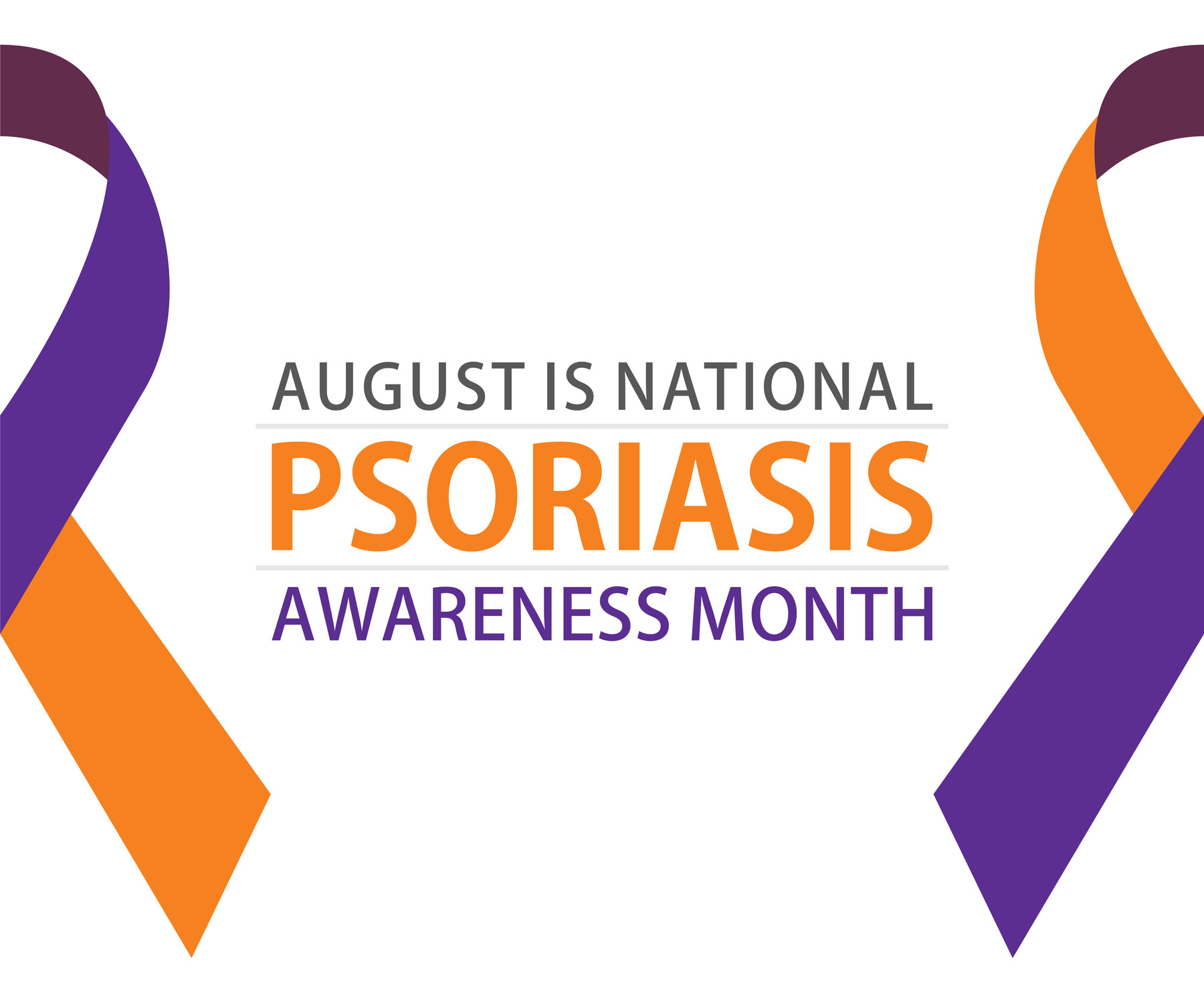Psoriasis Explained
~ by Carol Vartuli
Psoriasis (pronounced Sor-eye-ah-sis) comes from the ancient Greek word psora -- meaning itch. Psoriasis is a common, chronic skin disease. Its most prevalent form, plaque psoriasis, is characterized by raised, scaly patches of skin that can be itchy and painful. Psoriasis commonly occurs on the knees, elbows, trunk, and scalp, but it can also appear on the face or genitals. Since August is National Psoriasis Awareness month, we want to share information about it because it is often a misunderstood medical issue.
On white skin, psoriasis plaques appear as raised, red patches covered with a silvery white buildup of dead skin cells (scale). On skin of color, plaques may appear darker and thicker and a purple or grayish color, or darker brown.
Psoriasis tends to go through cycles, flaring for a few weeks or months, then subsiding for a while or going into remission. It can be limited to one or two patches that are hidden under clothing, or it can cover half to three-quarters of a person's body. It is not contagious, but observers can confuse it with herpes or other transmissible skin diseases. This stigmatizes those with psoriasis, often resulting in anxiety or depression.
Called the "Heartbreak of Psoriasis" in advertisements for medications, "these mood problems may go deeper than simply being unhappy about having an unsightly skin disease" says Dr. Suzanne Olbricht, associate professor of dermatology at Harvard Medical School. She explains that psoriasis is an inflammatory condition, and that "people with psoriasis are more likely to have other conditions linked to inflammation, including heart disease, diabetes, obesity, and inflammatory bowel diseases such as Crohn’s disease and ulcerative colitis."
Risk Factors and Psoriasis Triggers
While it is an autoimmune disease, the exact cause of psoriasis is unknown. As in all autoimmune disorders, parts of the body’s immune system become overactive and attack normal tissues.
Research indicates that genetics and environmental factors play a role in psoriasis. If your parent or parents have psoriasis, for example, your chances of developing it are greatly increased. About one-third of cases begin in childhood.
But anyone can develop psoriasis. According to a 2021 JAMA Dermatology study, more than 7.5 million American adults have psoriasis.
High stress levels can make one more susceptible to psoriasis, because stress is known to affect the immune system. Smoking tobacco also increases the risk of developing psoriasis, and can increase its severity.
People who are more likely to develop psoriasis may be symptom free until the disease is activated. According to the Mayo Clinic, common environmental 'triggers' include:
- Infections, like strep throat or skin infection
- Weather, especially cold and dryness
- Skin injuries: scrapes, cuts, bug bites, severe sunburn
- Smoking, and second-hand smoke exposure
- Heavy alcohol use
- Lithium, blood-pressure, and anti-malarial medications
- Rapid withdrawal of corticosteroids
Complications
About one-third of psoriasis sufferers develop psoriatic arthritis, causing pain, stiffness, and swelling of the joints. It can also occur in people without skin eruptions, especially if they have relatives with psoriasis. Since this condition can cause permanent joint destruction, it's important to consult a rheumatologist to determine treatment.
Treatments
Treatment for psoriasis begins with a correct diagnosis by a dermatologist. In early stages, psoriatic lesions may be confused with other skin conditions. Depending on the severity of the disease, treatment may be as simple as topical creams or ointments, over-the-counter, or prescription.
Phototherapy treatments (exposing the skin to ultraviolet light) may be prescribed by a dermatologist. Light therapy can be tailored to small surface areas, like hands or feet, or to full body. To be effective, light therapy must be consistent.
Oral, systemic medications work throughout the body to treat moderate-to-severe psoriasis. They are also used by those for whom topical medications or light therapy are not effective.
Biologics are drugs administered by injection or infusion that target specific immune cells or proteins. Biologics present an option for people who do not respond to, or have had harmful side effects from other treatments.
In addition to these therapies, people with psoriasis can stay abreast of the latest research and coping strategies at the National Psoriasis Foundation's website. The site includes a one-on-one peer support program, and an official online community of 90,000 people living with psoriasis and psoriatic arthritis.
Psoriasis is a medical issue that is often misinterpreted by those who experience it and by those who see it on others. Knowing the facts about it can help all of us deal with it a little more effectively.
The information in the above article is not intended nor implied to be a substitute for professional medical advice, diagnosis, or treatment. Always seek the advice of your physician or other qualified health provider with any questions you may have regarding a medical condition.
